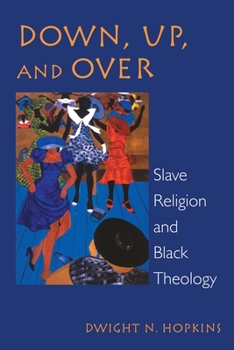Down, Up, and Over: Slave Religion and Black Theology
Select Format
Select Condition 
Book Overview
Hopkins contends that the lives of enslaved African Americans were the foundational source of liberating faith and practice for African Americans today. Down, Up, and Over draws on their religious experience, and the example of their faith and witness, to develop a constructive theology of liberation. "African American belief structures and hope practices blossom from the black folk's religious encounters with God," Hopkins contends. The first half of his ambitious work reconstructs the cultural matrix of African American religion-a total way of life formed by Protestantism, American culture, and the institution of slavery (1619-1865)-in which racial identities developed. Whites from Europe and blacks from Africa arrived with specific, differing views of God, faith, practice, and humanity. Hopkins recreates their worldviews and how white theology sought to remake African Americans into naturally inferior beings divinely ordained into subservience. The counter voice of enslaved blacks begets the Spirit of Liberation. Tracking that Spirit, Hopkins crafts an explicit black theology of the Spirit of Liberation for us (God, chapter 4), with us (Jesus, chapter 5), and in us (human purpose, chapter 6). Out of the crucible of slavery emerges the lineaments of a constructive religious vision: the constitution of a new self and a divinely purposed "liberation toward full spiritual and material humanity." Hopkins sweeping vision, impressive scholarship, and astute social analysis make for a fascinating and important volume, one that can help all readers find meaning and purpose in the daunting 350-year pilgrimage of African Americans.
Format:Paperback
Language:English
ISBN:0800627237
ISBN13:9780800627232
Release Date:November 1999
Publisher:Fortress Press
Length:312 Pages
Weight:1.12 lbs.
Dimensions:0.8" x 6.0" x 9.0"
Customer Reviews
1 rating
Shoes That Fit Their Feet
Published by Thriftbooks.com User , 19 years ago
"Down, Up, and Over" traces the complex relationship between White Protestantism, Black Slave Christianity, and post-modern Black Liberation Theology. Though Dwight Hopkins' political and theological stances may not always resonate with all readers, his historical culling of and comparison between Black and White American Christianity is fascinating. Regardless of one's political and/or theological positioning, it would be difficult to read this work without an increasing empathy for what Black Americans endured from their White Christian "brothers and sisters." Hopkins' research into primary sources offers a detailed examination of what enslaved African Americans endured and believed. His passionate presentation transports readers into the very soul and shoes of their forefathers and mothers of the faith. The overall message of the book can lead anyone with an open mind and sensitive heart to a greater understanding of the historic African American Christian experience and current African American Christian theology. The reader need not agree with all the political and theological conclusions in order to benefit from the contextual and cultural explanation of modern Black theology based upon past Black spirituality. Reviewer: Robert W. Kellemen, Ph.D. is the author of "Soul Physicians," "Spiritual Friends," and "Beyond the Suffering: Embracing the Legacy of African American Soul Care and Spiritual Direction."





